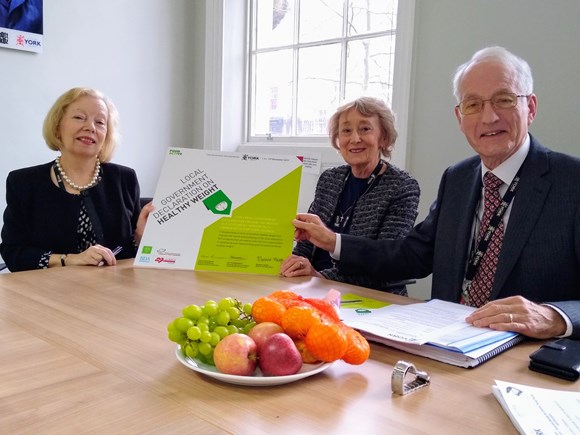
17 Dec 2019
Photo story: Councillors sign pledge to tackle obesity

Councillors have today (17 December) signed a declaration to tackle obesity and implement new measures to help more people, young and old, live with a healthy weight. York joins 20 other local authorities in making such a commitment.
At a decision session today, Cllr Ian Cuthbertson, Executive Member for Children and Young People and Cllr Carol Runciman, Executive Member for Health and Adult Social Care signed the Local Government Declaration on Healthy Weight, building on existing work the council is doing, and agreed to set five key priorities:
- Increasing sustainable and active travel, as part of our aim for York to become a carbon neutral city by 2030
- Developing and implementing a Sport and Physical Activity Strategy for the city
- Supporting the wellbeing and health of council staff
- Working with Public Health England and neighbouring councils on using health evidence in planning decisions
- Mobilising and promoting our community assets, such as York’s vibrant community food programmes.
The Local Government Declaration on Healthy Weight is underpinned by 14 standard commitments, including: encouraging responsible retailing, working to limit marketing of junk food to children, considering commercial partnerships, and increasing provision of healthy food and drink in public buildings.
Councillor Ian Cuthbertson, Executive Member for Children and Young People said: “Currently, around 1 in 4 five year olds, 1 in 3 eleven year olds and just under 2 in 3 adults in York are above a healthy weight.
“Healthy eating advice is important, but we know that the modern food environment doesn’t always make it easy to opt for the healthy choice, or encourage us to take enough exercise. Today we are signalling our ambition for York to be a place where people are helped to live at a healthy weight.”
Councillor Carol Runciman, Executive Member for Health and Adult Social Care said: “Our Council Plan focuses on every person enjoying the best possible health and wellbeing throughout their life.
“Unhealthy weight can have an impact on someone’s physical and mental health. This is why it is important we put in place measures to change the local environment so we can support people to live healthier lives, building on existing work taking place across the city. Signing the healthy weight declaration today is a really important step and sets out what we will be doing to help residents in the coming months.”
Robin Ireland, Research Director at Food Active, said: “Congratulations to City of York Council for taking this stand.
“We all know how difficult it is to make the right choices when we are surrounded by unhealthy food, the wrong advertising messages and when sugary drinks are cheaper than water. I am delighted that City of York Council is doing everything they can to help their residents, workers and pupils eat healthier and be more active.”
ENDS
Photo caption: Sharon Stoltz, Director for Public Health signs the healthy weight declaration with Cllr Carol Runciman, Executive Member for Health and Adult Social Care and Cllr Ian Cuthbertson, Executive Member for Children and Young People after signing the healthy weight declaration.
Contact Information
Andrew Harrison
York City Council
andrew.harrison@york.gov.uk
Notes to editors
Food Active is a healthy weight programme of work delivered by the Health Equalities Group. The programme aims to tackle the social, environmental, economic and legislative factors which influence people’s lifestyle choices and behaviours. One of the key areas of work is the Local Government Declaration on Healthy Weight. The declaration includes 14 standard commitments whereby Local Authorities pledge to achieve action on improving policy and healthy weight outcomes in relation to specific areas of the council’s work. Within the declaration there is also the opportunity for Local Authorities to add local commitments relevant to their needs and aspirations. These local priorities are usually determined through consultation with key stakeholders involved in delivering public health.


